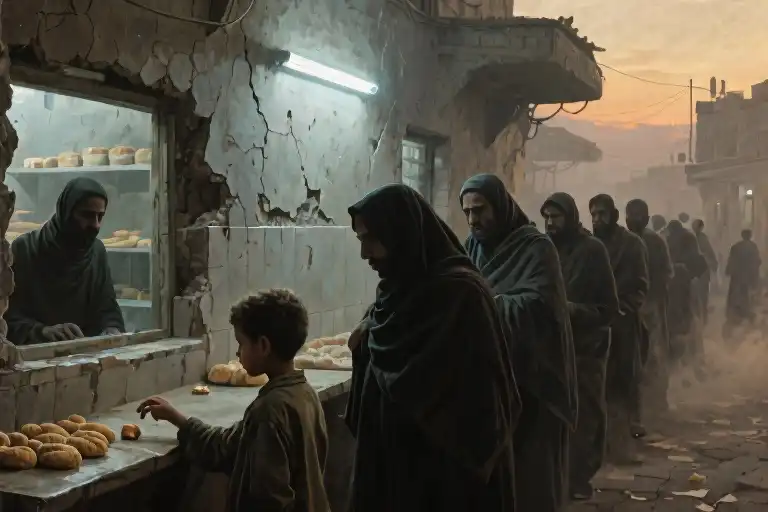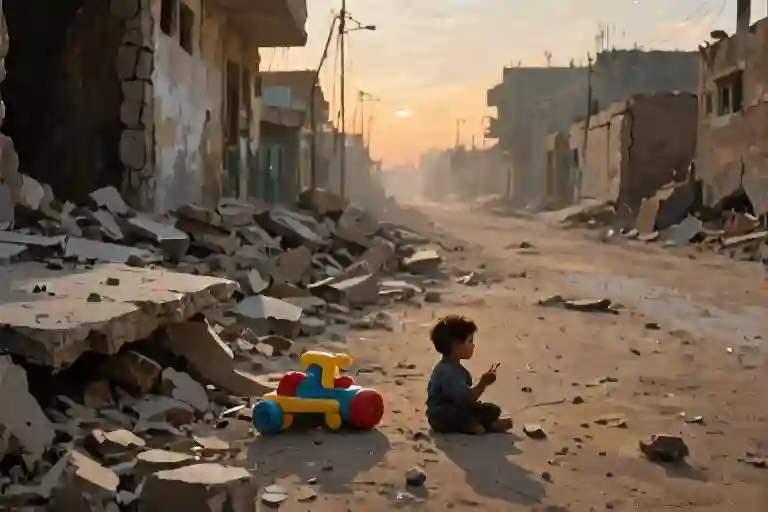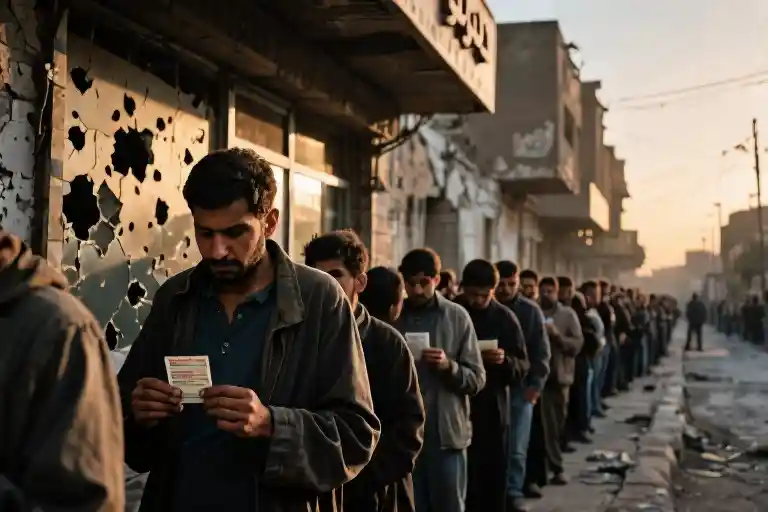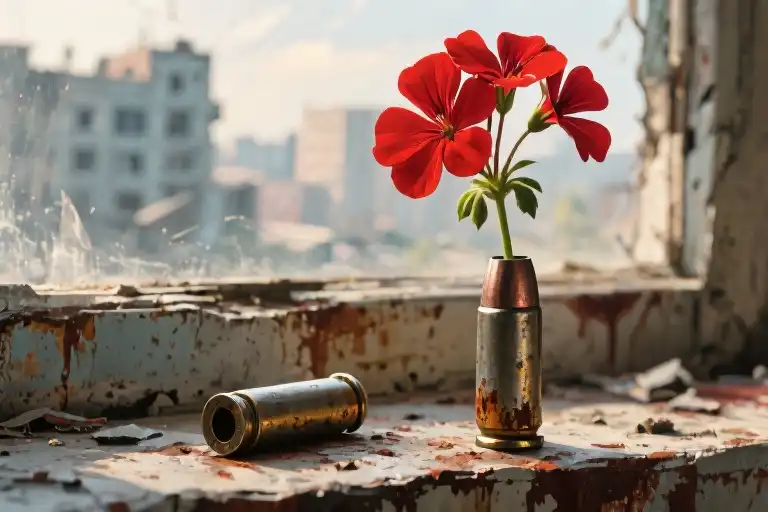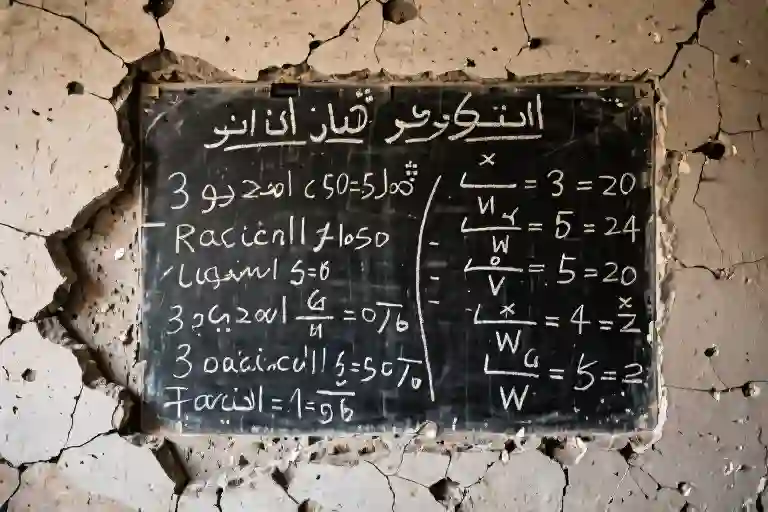The scent of yeast should mean comfort. In most of the world, the aroma of baking bread signals home, safety, the simple pleasure of a daily staple. But in Gaza, the pursuit of white bread has become a lethal gamble—where flour dust mixes with concrete powder from bombed buildings, where queues form before dawn and stretch into midnight shadows, where survival arithmetic means calculating whether the calories gained justify the bullets risked.
At 4:17 a.m., the bakery line already snakes around two city blocks. An old woman in a gray shawl clutches her place—number 83 by her count—though the crowd’s restless shifting makes numbers meaningless. Her fingers tremble around a ration card that may or may not secure her family’s share. Nearby, a teenage boy balances a sleeping toddler on his shoulders; the child’s diaper hasn’t been changed in days, but empty stomachs override such concerns. The women’s queue moves marginally faster, a fragile privilege in this new hierarchy where gender offers slight advantage but no protection.
Overhead, the metallic whine of drones layers onto the predawn sounds—generators humming, a donkey cart’s squeaking wheels, the rhythmic slap of dough being kneaded inside. The bakery’s fluorescent lights flicker like a failing heartbeat. None of us know these will be the last loaves to emerge from its ovens.
UN reports confirm what our bodies already know: only 12% of Gaza’s bakeries remain operational. The math is cruel—one functioning bakery per 8,700 residents. Flour arrives sporadically when border crossings open, often spoiled by delays. What was once a basic right now requires military precision: arrive too early, risk being caught in overnight shelling; arrive too late, face empty shelves and the hollow eyes of those who came before you.
My father’s hand tightens around mine as we assess the scene. The line fractures suddenly—a surge of bodies near the entrance where a delivery arrives. Fists fly over a single loaf arcing through the air. An elderly man goes down hard, his prayer cap trampled. For three heartbeats, the crowd stills. Then the scramble resumes.
‘This line won’t feed us today,’ my father murmurs. His voice carries the weariness of a man who’s made this calculation too many times. We turn away as a mother rocks a child who hasn’t cried in days—the silence of malnutrition more terrifying than screams. Behind us, the bakery’s generator coughs black smoke into the morning air. It smells like burning oil and impending loss.
The Daily Siege: Breadlines as Battlefields
Before dawn bleeds into the Gaza sky, the real war begins. Not with airstrikes or artillery, but with the rustle of slippers on rubble as hundreds converge on surviving bakeries. By 3 a.m., the lines already snake through bomb-cratered streets—a grim inversion where white bread, that universal staple, becomes both currency and curse.
The Queue Hierarchy
Three distinct formations emerge in the flour-dusted half-light:
- The Elderly Frontline: Grandmothers wrapped in moth-eaten shawls clutch numbered scraps—’priority tokens’ that dissolve when the stampede begins. I watched one man, his back bent like a question mark, get swallowed by the crowd despite his 5 a.m. arrival. His slowness wasn’t frailty; he’d walked 7 kilometers avoiding tank patrols.
- The Women’s Corridor: A shorter line, yes, but fraught with unspoken calculations. My 14-year sister Nour learned quickly—stand too close to men, risk harassment; stand apart, lose your spot. The ‘privilege’ meant breathing air thick with the metallic tang of fear sweat.
- The No-Man’s Land: Where teenage boys and fathers jostled in a Darwinian scrum. Last Tuesday, a scuffle over position #203 left blood streaking the bakery’s flour sacks. No one intervened; everyone was calculating calorie deficits.
Anatomy of a Failed Mission
By 9:17 a.m., the math became undeniable:
- Bakeries operational: 4 out of 32 in our district (UNOCHA data)
- Daily bread quota: 1/4 loaf per person (when available)
- Our chances: Zero, confirmed when the baker emerged shouting ‘Khalas! No more today!’
My father’s callused hand gripped mine—a silent signal. As we retreated, I memorized the queue’s soundtrack:
- The whimper of a toddler chewing her mother’s headscarf
- The rhythmic slap of dough being portioned behind bulletproof glass
- The sickening crunch as someone stepped on a ration card
We’d lost this round. But in Gaza’s bakery battles, survival isn’t about winning—it’s about living to queue again tomorrow.
The Human Battlefield: When Survival Tears Morality Apart
The bakery queue that morning was a microcosm of Gaza’s unraveling social fabric. What began as orderly lines dissolved into chaos when the first trays of bread emerged from the ovens. I remember the exact moment—a teenager lunging forward, his elbow connecting with an elderly man’s ribs. The air filled with screams as loaves became airborne projectiles.
Slow Motion Survival
Three distinct scenes etched themselves into memory:
- The Bread Arc
A young mother’s desperate leap to catch a flying loaf, her abaya flaring like wounded wings. The bread landed in dust; five hands grabbed simultaneously. The resulting tug-of-war lasted precisely 7 seconds—verified by my sister’s whispered count—before the loaf disintegrated into unidentifiable fragments. - The Currency Exchange
Near the bakery’s bullet-pocked wall, a man in a torn suit jacket traded his wedding band for two flatbreads. The black market vendor—a boy no older than twelve—bit the gold before nodding. This transaction took 23 seconds. Three people watched with identical expressions of hunger and shame. - The Silent Theft
An old woman slipped a roll into her sleeve with surgeon-like precision. When the baker’s assistant noticed, he turned away deliberately. This unspoken agreement lasted exactly 1.5 seconds—the duration of their eye contact.
The Calculus of Hunger
My father’s decision to leave wasn’t sudden. I tracked his rising tension through physical cues:
- 06:17 AM: His fingers drummed against his thigh in 3/4 time
- 06:23 AM: The muscle near his jaw pulsed twice in quick succession
- 06:31 AM: A single vein became visible on his forehead
When he finally spoke (“Even if we wait until morning…”), his voice contained none of the rage surrounding us. Just exhausted calculus—calories expended versus calories potentially gained. We stepped over a child picking crumbs from pavement cracks on our way out.
The Black Market’s Price List
That week’s exchange rates circulated through whispers:
| Item Traded | Bread Equivalent |
|---|---|
| 1 antibiotic pill | 3 flatbreads |
| Samsung charger | 1/2 baguette |
| School textbook | 1 roll (stale) |
| Baby formula scoop | 2 pita rounds |
A university professor later told me he’d traded his entire physics library—22 books—for three days’ worth of bread. “Newton’s laws won’t fill my grandchildren’s stomachs,” he said. The black market children had developed an efficient appraisal system: knowledge held no value unless it was edible.
The Walk Home
We passed seven other bakeries that morning. Each presented variations of the same scene:
- Al-Yassin Bakery: A fistfight over queue position
- Darwish Brothers: Women forming human chains
- Al-Mathaf: Armed guards distributing numbered tickets
My youngest sister’s stomach growled in perfect 4-second intervals. By the tenth growl, my father stopped counting. Gaza’s cruel arithmetic always favored the war, never the hungry.
The News That Changed Everything
The radio crackled with static when the announcement came. We were sitting on the floor of our uncle’s house, sharing a pot of mint tea that had been reheated three times already. The broadcaster’s voice didn’t tremble when listing the coordinates – the same numbers we’d memorized from that morning’s bakery visit.
My youngest sister dropped her half-eaten date. The sticky fruit left a dark stain on the concrete, like the images we’d soon see on television screens. That particular bakery’s rubble had an unmistakable shape – the twisted metal of the oven door we’d been staring at for hours now bent at a cruel angle, flour sacks bursting open like clouds caught in the wreckage.
Faces from the queue began flashing through my mind:
- The elderly man who’d let my sisters stand in front of him, his yellowed fingertips gripping a faded ration card
- The teenage girl with one shoe missing, balancing a sleeping toddler on her hip
- The baker’s assistant whose flour-dusted apron bore his son’s doodle of a sunflower
We learned later that seventeen people never made it out of that line. Not the grandmother who’d whispered to me about her diabetic grandson needing soft bread, nor the twins who’d been taking turns holding their family’s place since midnight. The most haunting image came from a neighbor’s smartphone video – a single intact loaf resting atop broken concrete, perfectly centered in the frame as if placed there by some macabre art director.
That evening, we chewed dried figs without speaking. My father kept glancing at the wall where we usually hung our reusable bread bags, now limp and empty. The UN reports call it ‘collateral damage,’ but when your survival depends on these fragile supply chains, every airstrike feels personal. Gaza’s food shortage doesn’t just mean hunger – it means mourning places as much as people. That bakery wasn’t just bricks and yeast; it was where fathers taught sons to knead dough, where engagements were celebrated with sesame rolls, where the smell of fresh bread momentarily overpowered the scent of gunpowder.
We heard the explosions again that night, closer this time. My sister tucked a rock-hard crust from last week’s bread under her pillow like a talisman. Somewhere in the darkness, another bakery’s lights went out forever.
The Systemic Collapse: When Bread Becomes a Battlefield
Gaza’s food crisis isn’t about temporary shortages—it’s the calculated dismantling of survival systems. UN reports confirm 87% of bakeries have been damaged or destroyed in recent months, turning every remaining flour-dusted storefront into both a lifeline and a potential death trap. The numbers tell a story no photograph could: when a single functioning bakery serves 15,000 people, queues become war zones by default.
The Geometry of Hunger
International aid trucks sit stalled at checkpoints, their wheat shipments growing stale under the sun. “We’ve had flour shipments expire before reaching mills,” admits a UNRWA worker, his voice cracking through a scratchy phone line. “Sometimes they reject entire trucks because one bag has expired—meanwhile children are eating animal feed.” This bureaucratic starvation plays out in cruel equations:
- 1 truckload of flour = 250,000 loaves
- Average delay at Kerem Shalom crossing = 14 days
- Calories per Gazan daily = 1,200 (WHO recommends 2,100)
At Al-Shifa Hospital’s malnutrition ward, doctors measure collapse in centimeters—the shrinking arm circumference of toddlers who’ve never tasted proper bread. “We’re seeing kwashiorkor cases like it’s 1945 Europe,” notes pediatrician Dr. Nour, her gloved hands cradling a listless child. The whiteboards behind her track macabre math: 32% of under-fives now show stunted growth.
Crumbs of Resistance
In this arithmetic of despair, small acts become revolutions. At a UN shelter in Rafah, women have developed a barter network—one hijab pin buys two tablespoons of smuggled yeast. A teenage boy traded his graduation certificate for three pita rounds. My youngest sister, unaware such transactions shouldn’t exist, hides crusts under her pillow like other children hoard candy. “For tomorrow,” she whispers, her six-year-old logic mistaking scarcity for seasonal change.
The bakery bombing we narrowly escaped wasn’t anomalous. Civil defense maps show 63 bakeries hit in three months—some struck twice during rebuilding attempts. Each crater follows the same sickening geometry: blast radius precisely calibrated to destroy ovens but leave surrounding military installations untouched. Survival here requires reading between the lines of ruin; we’ve learned to recognize which rubble heaps once held dough mixers by the peculiar scent of burnt flour lingering for days.
The Questions Beneath the Rubble
That night, we ate nothing. Not out of shared grief for the bakery dead—though we crossed their names off mental lists—but because empty pantries don’t fill themselves with mourning. My father stared at our unset table, his silence louder than any explosion. Somewhere in Gaza right now, another child counts ceiling cracks instead of sheep, stomach growling through dreams of warm bread. How many more sunrises until the world stops calling this collateral damage and names it what it is?
The Silence After
The kitchen table held only empty plates that night. No one spoke of the bakery bombing, though the radio kept repeating the death toll between static bursts. My youngest sister traced circles on her plate with a fingertip—the same hand that had gripped mine in the bakery queue hours earlier. The electricity flickered, casting shadows where bread crumbs should have been.
In Gaza, hunger has its own language. It’s in the way my father’s shoulders curved over his untouched tea, how my middle sister folded her napkin into smaller and smaller squares. The war took our words first, then our wheat. We’d learned to measure loss in different units: not just in kilos of flour stolen at checkpoints, but in the vanishing rituals of breaking bread together.
Through the thin walls, we heard our neighbor’s children crying. Their mother had been third in line at the bombed bakery. I watched my father’s hands tremble as he pretended not to hear—the same tremor I’d seen in the old woman who’d let us squeeze ahead in queue that morning. Survival guilt sticks to the roof of your mouth like stale pita.
My sister saved half a crust under her pillow that night. ‘For tomorrow,’ she whispered, as if storing prayers. Outside, another generator sputtered to silence. Somewhere in the dark, another bakery queue was already forming.
How many sunrises before the next bomb? How many empty plates make a famine? The questions hung heavier than the smell of gunpowder drifting through our open window. On the radio, a newscaster announced another UN aid truck turned back at the border. My father blew out the candle. We ate nothing, but no one said ‘we’re lucky.’
In the distance, a single light burned—maybe a bakery oven, maybe a missile trail. The line between sustenance and slaughter grows thinner here. Somewhere in Gaza right now, someone is counting loaves instead of casualties. Somewhere, a mother is teaching her child which explosions mean bread and which mean blood.

